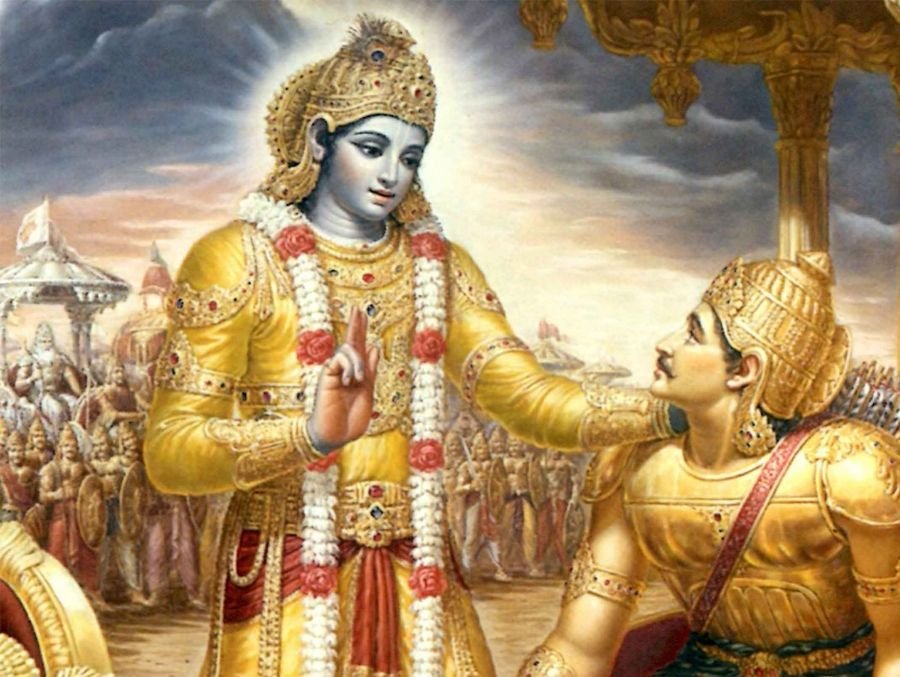(Image Courtesy Mahanidhiswami)
Purifying And Conquering The Mind And Continuously Immersing It In God Leads to Liberation
युञ्जन्नेवं सदात्मानं योगी नियतमानस: |
शान्तिं निर्वाणपरमां मत्संस्थामधिगच्छति || 6.15||
yuñjann evaṁ sadātmānaṁ yogī niyata-mānasaḥ
śhantiṁ nirvāṇa-paramāṁ mat-sansthām adhigachchhati|| 6.15||
Shloka Translation
BG – Ch. 6- Ver. 15:
In this way, the yogi who has conquered his mind and constantly engages himself in me achieves ultimate liberation-bearing serenity, which is established in me.
Explanation
There are many different meditation techniques available around the world. Which of these methods should we use in our own practise? This puzzle is made simple by Shree Krishna. He claims that the only goal of meditation should be God himself. Meditation is used to not only improve concentration and focus, but also to purify the mind.
The mind can only be purified when it is fixed on an all-pure object, which is God himself. God is beyond the three modes of material nature, and focusing one’s thoughts on him elevates one’s mind above the three modes as well. As a result, authentic transcendental meditation is solely focused on God.
We can meditate on all of God’s divine attributes, including names, forms, virtues, pastimes, abodes, and associates. As a result, devotees can focus on any of these to reap the full benefits of God meditation. For most practitionars the name alone isn’t enough to charm the mind. The mind is naturally driven to forms due to sanskaras of infinite lifetimes. Meditation becomes natural and simple when the figure of God is used as a foundation. This is referred to as rupa dhyana meditation.
Once the mind is concentrated on God’s form, we can strengthen it by thinking about God’s virtues—his compassion, beauty, knowledge, love, benevolence, grace, and so on. Then, by serving God in the mind, one can progress in meditation. This is known as manasika seva (serving God in the mind). We can contemplate God’s names, shapes, virtues, pastimes, and so on in this way. Shree Krishna reveals the ultimate rewards of meditation at the end of the verse, which are liberation from Maya and the everlasting bliss of God-realization.
Verse & what we can learn
Shri Krishna claims that meditating in the manner described here brings us the peace that leads to self-realization. Obviously, the route to this final goal will take a long period. However, there are certain intermediate outcomes along the route. A person who begins to let go of attachment and interest with material objects achieves an ever-increasing sense of calm.
This serenity, however, does not lead to liberation. Only by concentrating on one’s own self can one be liberated. Initially, the sense of tranquilly is only felt while meditating, but it gradually grows stronger and lasts longer. The person may fail in his quest till he reaches the final stage. He will never turn back once he has reached the ultimate step.
Only the eternal essence has the ability to provide everlasting joy and peace. Everything else only provides a brief relief. As a result, Shri Krishna asks the seeker to recognise this fact and quit chasing happiness and tranquilly in the earthly world.
To acquire knowledge and to implement that knowledge in life one needs to be mentally and physically active and healthy and for that daily meditation is a great tool.
There are various types of meditation like Buddhist meditation, heartfulness meditation, mindfulness meditation, meditation for stress, and each meditation benefits are countless. There are also numerous meditation techniques for beginners which help in practicing daily meditation so go ahead and start your journey towards a peaceful and balanced life.
In the Next verse, Shri Krishna tells Arjuna about those factors that does not help one to become successful in yoga.
Let’s learn to live with “The Gita” via Meditation Affinity…
